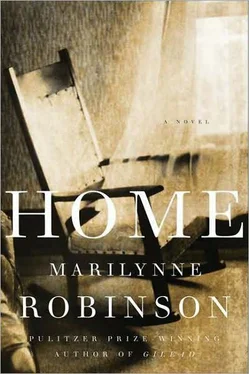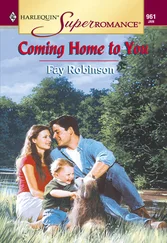It was an infection a little penicillin could have cured, but there was no penicillin then, or for years afterward. No one was at fault, really. Something like it could have happened even if those two children had come to live in Gilead. Every family had a story that would have ended differently if only there had been penicillin. Chimerical grief — now guilt, now blame, now the thought that it could all have been otherwise.
But how had Jack ever involved himself with that girl? That was where fault lay, impervious to rationalization, finally even to pardon. Such an offense against any notion of honor, her father had said, and so it still seemed to her, and to him, after all those years. She had followed her father’s thoughts back to that old bitterness, and bitterness simmered in his half-closed eyes as he reflected on the inevitability of his disappointment.
IT WAS LATE EVENING WHEN THEY HEARD JACK COME INTO the porch. He might have expected his father to be in the parlor, reading in his Morris chair. The other evenings he had spoken to Glory as he passed, called good night to his father, and gone up to his room. But this time the old man would not leave the table. “I’m going to wait for him. I’m going to stay right here.”
Finding the old man still in the kitchen when he came in, Jack paused, reading the situation as he had always done, aware of having fallen into some frail web of intention. He looked at Glory, then he simply stood there, hat in hand, and waited. Distant, respectful and tentative.
“Jack,” his father said.
“Sir.”
“I think we need to have a conversation.”
“A conversation.”
“Yes. I think you had better tell me how things stand with you.”
Jack shrugged. “I’m tired. I hope to sleep.”
The old man said, “You know perfectly well what I mean. I want you to tell me if there are — obligations that require the help of your family. Things that might have happened there in St. Louis that you haven’t told me about. That trouble you.”
Jack looked at Glory. There it was, however mild and kindly meant, the aspersion he dreaded. He put his hand to his face and said, very softly, “Another time.”
“Sit down, son.”
He smiled. “No.” Then he said, “My obligations are my problem, I’m afraid.” It was his sadness that made him so inaccessibly patient.
His father said, “Your obligations are your problem if you can meet them. If not, they become my problem. Things must be seen to. It’s only decent.”
Fealty to kin, actual and imagined, and the protection of them, possible or not, were their father’s pride, his strongest instinct, and his chief source of satisfaction, frustration, and anxiety. He had drawn himself up so that his words would have the force and dignity of their intent, but his eyes were closed and his mouth had turned down and the rectitude of his posture exposed his narrowed shoulders and his fallen throat. Jack gazed at him as if his father were the apparition of all the grief and weariness he had cost him, still gallant in his weakness, ready to be saddened again, ready to be burdened again.
“No. No, sir. Another time.”
“You know there won’t be another time. You’re planning to leave now.”
“I might not be here much longer. I’m trying to make some decisions.”
His father’s head fell to the side. He said, “I hope very much you will decide to stay. Stay for a while.”
Jack said, “That’s very kind.”
“No, it is just a hope of mine. It will be kind of you to give it a little consideration, if you can. Now Glory will help me to bed.”
THE NEXT MORNING THE OLD MAN POKED HIS SPOON AT his cereal for a little while, and then he said, “I want to talk with Ames. You can take me there in the DeSoto.”
The car worked well enough for errands, and Glory had used it to drive the Ameses to the river for a birthday picnic. Her father had not felt comfortable enough to go along that day, and when she mentioned it to Jack, he laughed at the idea—“ Et ego in Arcadia ”—but at least everything had gone well enough with the car to encourage her to make more use of it. Her father thought often about the DeSoto. In his mind it was an open promise of mobility, a puissance that could also be a boon to his good friend. So his thinking about it was generous and agreeable, tonic. He had not, however, consented to ride in it since the day Jack took them out to the country.
“Mrs. Ames and the boy will be there,” he said.
“I’ll take them to the matinee.”
“Very good.”
Glory arranged the day to her father’s specifications, and after lunch she helped him down the stairs and into the car. There was a ringing loneliness in the house with Jack always away somewhere, and it felt good to her to leave it for a while, to take her father away from it. She drove him past the church and past the war memorial to let him admire the gardens and the trees, and then she took him to Ames’s house and helped him again, out of the car, up the walk, up the steps. Ames seemed startled to find him at his door.
“Yes,” the old man said, “I thought you and I could look after each other while the women are out at the movies. I came over here in the DeSoto.”
Ames pulled a chair away from the table. “Unless you would rather sit somewhere else.”
Boughton said, “No, this has always been my chair, hasn’t it. My pew.” He sat down and hung his cane from the edge of the table and closed his eyes. Lila and Robby came downstairs, Robby with his hair neatly parted and his cheeks pink with scrubbing. Glory took them off to the musty little movie theater, where they watched good triumph over evil by means of some six-shooters and a posse. “Say your prayers!” said the bad guy to the harmless citizen trapped against a canyon wall. And in the moment he so graciously allowed his captive, horses came clattering up from behind him and he was made to drop his gun. Robby was amazed and gratified by this turn of events, which was as much as Glory could hope for. With previews and newsreels and a cartoon, and a short second feature in which good triumphed once again, more than two hours had passed by the time they came blinking out into afternoon sun.
The old men were still sitting at the table, and Jack was with them. He looked at Glory and smiled. “There was no one at home, so I thought something must be the matter. I came here—” She had not seen him for three days, except when he walked past her on the way to the door, saying nothing, tipping his hat as he left, or walked through the kitchen on the way to his room, saying only good night. It had never crossed her mind that he would come looking for them. If they had been there, it might have been the beginning of better times. Just the thought gave her a twinge of blighted joy. She wanted to look at him, to see how he was, but his smile was cool. He might be angry. He must think she had betrayed him. Well, she had betrayed him. Dear God, she hadn’t meant to, and what did that matter, when her father was here confiding in Ames again, telling him under the seal of old friendship what he suspected and what he feared, just as he had done in the endless, excruciating past. It was bad enough last night, the way he spoke to Jack. And now this. If her brother had had one surviving hope, she knew it was that he could find some way to speak to Ames himself, in his own right. She was so glad to get her father out of the house, to give him the comfort of a visit to Ames’s kitchen — how long had it been? She hadn’t thought it through. Her father just sat there with his eyes closed.
Ames was visibly relieved to see the three of them. Robby scrambled into his lap full of the unspent energy the movie had summoned up in him. “You should’ve gone, Papa. You should’ve seen it.” He slapped the bottom of his Cracker Jack box and a few sticky morsels fell out on the table in front of his father. “I’m saving some for Toby.” Then he said, “Here,” and slid off his lap and went to Jack and dug out a few morsels for him. “There’s supposed to be a prize in here,” he said. “Do you see any prize?”
Читать дальше












